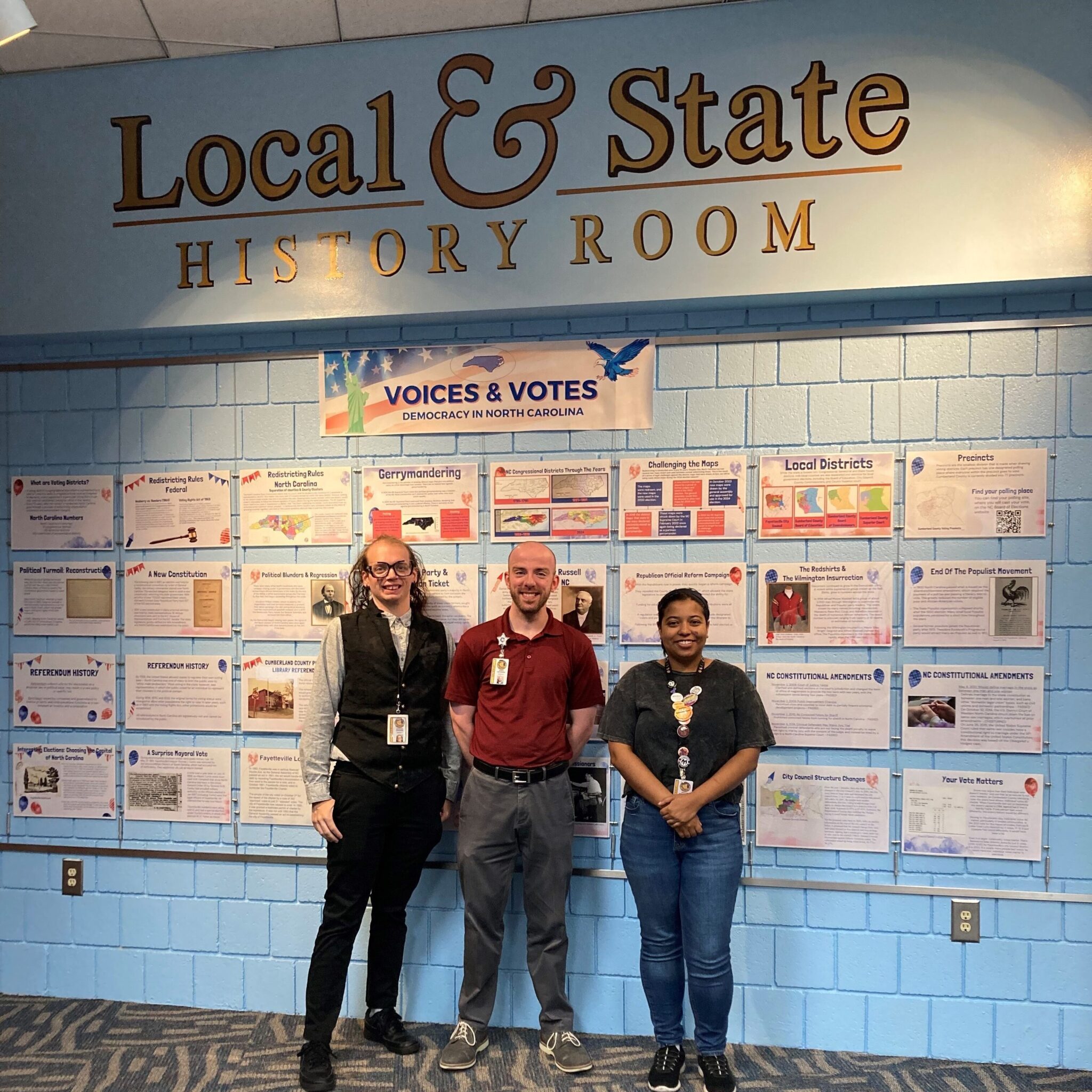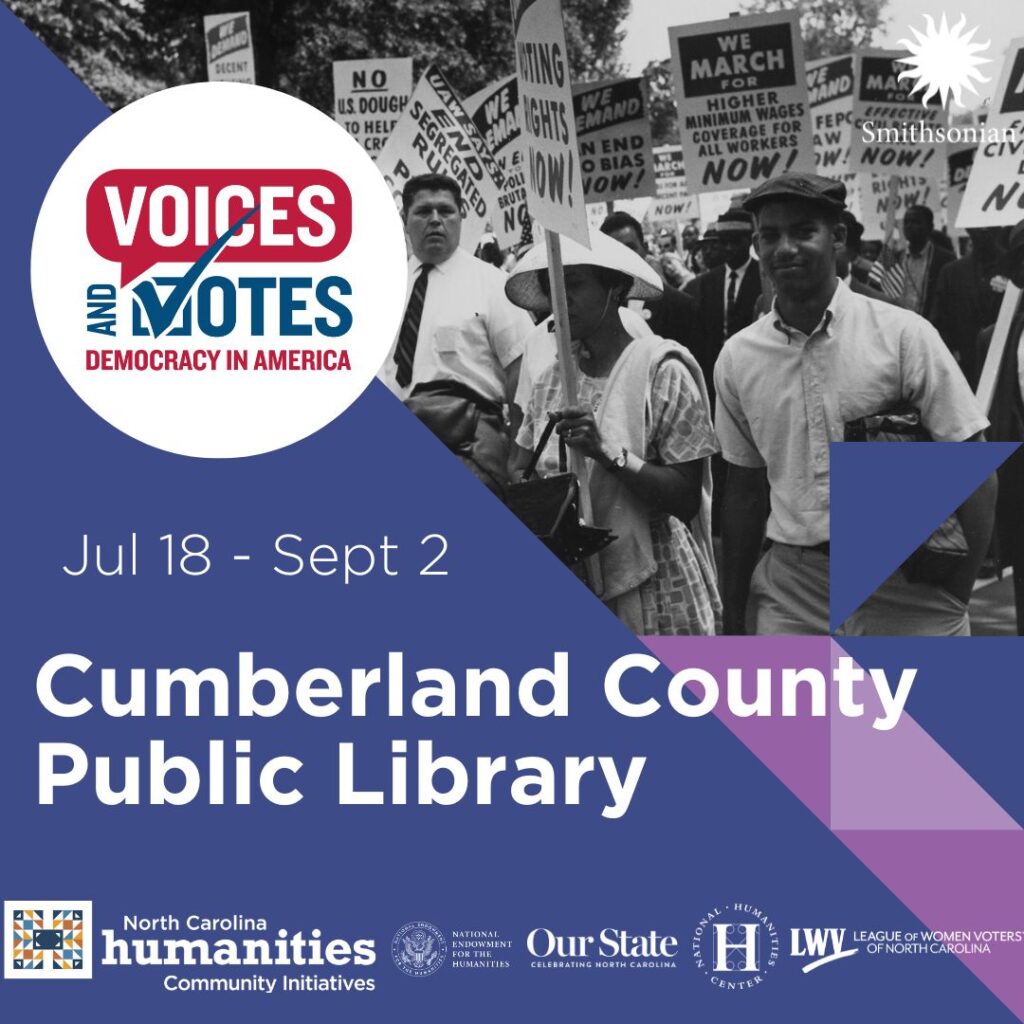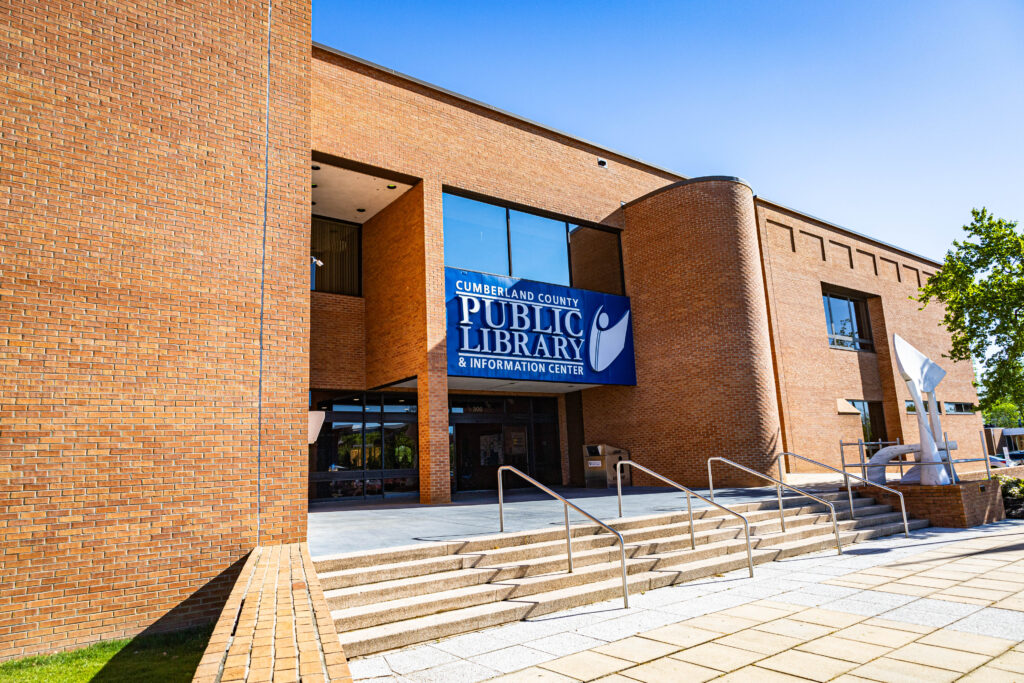North Carolina Humanities is proud to present the Smithsonian Institution exhibition “Voices and Votes: Democracy in America”. From revolution and suffrage, to civil rights and casting ballots, everyone in every community is part of this ever-evolving story – the story of democracy in America.
Six venues were selected by NC Humanities to host the exhibition around North Carolina in 2024-2025. As it travels, we are speaking with team members from each tour stop to discuss local issues, history, people, and stories, and to learn what visitors can expect to experience when they visit the exhibition in their space.
“Voices and Votes: Democracy in America” is on display at Cumberland County Public Library in Fayetteville, North Carolina from July 18 – September 2, 2024, during normal library hours. To learn more about how to visit the exhibition and attend related events and programs in Fayetteville, please visit: https://www.cumberlandcountync.gov/departments/library-group/library.
The tour began at Iredell County Public Library in Statesville in April 2024 and moved to Southwest Brunswick Branch Library in Carolina Shores in June. The exhibition is currently on view at Cumberland County Public Library in Fayetteville. Next, the exhibition will travel to Alamance Community College in Graham and Appalachian State University in Boone. The tour concludes at Henderson County Public Library in Hendersonville in January 2025.
We connected with Joseph Westendorf, local and state history department manager for Cumberland County Public Library, to learn more.

Tell us about your community and the library!
Joseph: Cumberland County Public Library is in Cumberland County, which is in the southeast part of the state. We’re right next to Fort Liberty, which is one of the biggest military installations in the country and is known as the home of the Airborne and the Special Forces. The library helps the community with lots of different services and serves many different types of people, including veterans and military families. The library has eight branches throughout the county. “Voices and Votes: Democracy in America” will be on view at Headquarters library in downtown Fayetteville.
Why did Cumberland County Public Library apply to host “Voices and Votes”?
Joseph: I only needed to read about this exhibition once before I said, “We should apply for this.” Seeing the exhibition themes, knowing that it is an election year, and understanding Fayetteville’s history, I thought that Fayetteville should have this exhibition. Since Fayetteville was named after Gilbert du Motier, Marquis de Lafayette, in one sense, we wouldn’t be having this discussion if it wasn’t for that! Lafayette was a crucial figure during the American Revolution who helped General Washington win independence for America. Fayetteville is also where the Constitution was ratified in North Carolina. It’s where North Carolina decided it wanted to be a part of the American experiment. That alone, I think, shows Fayetteville has deep historical connections to the themes of this exhibition. It’s been great working with North Carolina Humanities to organize this exhibition coming to Fayetteville.

What can people expect when they visit the library to see “Voices and Votes”? What related programs and opportunities are you offering?
Joseph: In addition to hosting “Voices and Votes” we will have a lot of local history programs and exhibits. We’ll have maps showing city council districts going back to 1986, because there’s been a lot of changes in the past few decades. We will look at how referendums and voting have a big impact on local communities. On July 27 we will host “The Vietnam War and the Fort Bragg Anti-War Protest Movement.” Fort Bragg had a lot of protesting relating to the Vietnam War and the draft. Maybe most notably Jane Fonda, the anti-war activist and actress, held multiple rallies in Fayetteville and on Fort Bragg. Fort Bragg actually banned her permanently because she was caught handing out anti-war leaflets on post! The program on July 27 will touch on that and how protestors were exercising their democratic right to protest. Then in September, we are hosting a former North Carolina appeals court judge who will give a talk on the history of North Carolina redistricting. We are also currently collecting oral histories relating to Eastover’s incorporation. Eastover is a small community in Cumberland County, which in the early 2000s, voted to become a town. These oral histories will showcase why they wanted to become a town, what their concerns were, and why they decided to become a town. We hope everyone will come see “Voices and Votes” and attend our programs. While here, I’d love to answer your questions and talk with you about your experiences.
How can people support the library?
Joseph: We are always looking for volunteers to help us in the library and help us digitize our resources! There is always something to do. You can learn about giving to the library at: https://www.cumberlandcountync.gov/departments/library-group/library/give-now/charitable-giving!
About the exhibition: “Voices and Votes: Democracy in America” is part of Museum on Main Street (MoMS), a collaboration between the Smithsonian Institution Traveling Exhibition Service (SITES), state humanities councils across the nation, including North Carolina Humanities, and local host institutions. “Voices and Votes” is based on a major exhibition currently on display at the Smithsonian’s National Museum of American History in Washington, D.C. called “American Democracy: A Great Leap of Faith”. North Carolina Humanities has worked with SITES for over a decade to bring MoMS exhibitions to North Carolina’s small towns and rural communities. Support for MoMS has been provided by the U.S. Congress. Thank you to our 2024-2025 statewide tour sponsors: Our State Magazine, the National Humanities Center, and the League of Women Voters of North Carolina, as well as the many local sponsors supporting the exhibit in their community. A full tour itinerary is available at nchumanities.org. North Carolina Humanities is a statewide nonprofit and affiliate of the National Endowment for the Humanities.
This interview has been edited for length and clarity.


